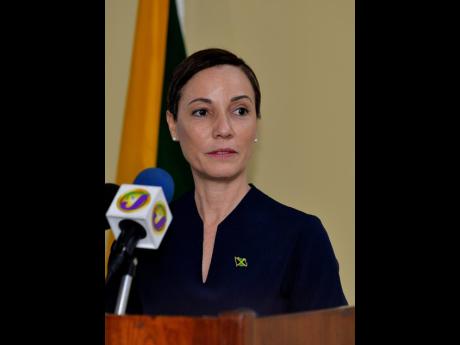High seas talks - Government consults US Embassy over Shiprider Agreement detentions
The Jamaican Government is now engaged in talks with United States Embassy officials to probe whether Washington adhered to maritime protocol in the wake of a lawsuit filed by four Jamaican fishermen who claim to have endured inhumane conditions while detained on US Coast Guard vessels for 32 days.
The American Civil Liberties Union (ACLU) last Wednesday filed a lawsuit in the US on behalf of the fishermen – Robert Weir, Patrick Ferguson, Luther Patterson and David Williams – who said they were captured by the US Coast Guard, stripped naked, given white, paper-thin overalls and disposable slippers to wear instead, and subsequently chained by their ankles to metal cables.
The Gleaner understands that George Thompson, the fifth fisherman who last week revealed details of the physical and psychological trauma he and his four colleagues faced during their detention, has since retained the services of US-based attorney-at-law Steven Watt, who is representing the other men, and is expected to join the lawsuit.
The five men were detained after the Jamaican Government granted a waiver of jurisdiction to the US Coast Guard under a 1997 agreement between the two countries, commonly referred to as the Shiprider Agreement, according to a press statement issued yesterday afternoon by the Ministry of Foreign Affairs and Foreign Trade.
MARITIME AGREEMENT
The original agreement, which represents cooperation between the countries’ anti-drug trafficking laws, did not allow US authorities to detain Jamaican nationals encountered at sea, but a 2016 amendment to Section 20 (Subsection 2) of Jamaica’s Maritime Drug Trafficking (Suppression) Act, which explicitly barred the US Coast Guard from detaining them, was removed.
The Kamina Johnson Smith-led foreign affairs ministry said yesterday that it “reiterates the seriousness it accords to promoting and protecting the rights of Jamaicans at home and abroad at all times as an essential pillar of its foreign and domestic policy.
“... In an effort to be able to assure the public that appropriate procedures are being followed to protect the human rights of our citizens in respect of Shiprider Arrangements, the ministry is also in discussions with the United States through its embassy in Kingston,” the statement said.
It is still not clear what level of engagement, if any, the Jamaican Government, through its consulate, had with US authorities subsequent to waiving jurisdictional rights over the five men.
Calls to Johnson Smith for clarification went unanswered yesterday evening.
But Watt, a senior staff attorney at ACLU, was emphatic that there are serious concerns about how individuals are treated after being detained by the US Coast Guard.
“The United States Coast Guard does not believe that any of the due-process protections that would be extended to a criminal defendant in the United States, whether they are a foreign national or a non-US citizen, are extended to the men on the ship, so they can hold them indefinitely, they can treat them however they see fit,” Watt said.
He asserted that no matter the allegations levelled against accused, they should not be subject to inhumane treatment.
“It wouldn’t matter if our clients were trafficking drugs. The CG (Coast Guard) should not have treated them the way it did. El Chapo had better treatment and more due process than our clients did. Our case challenges the length of the men’s incommunicado detention chained to the decks of Coast Guard ships and the inhumane conditions of that confinement. Their case doesn’t turn on their innocence of any drug-related charge – which the assistant US attorney prosecuting their case determined they were,” he said.
Joaquin Guzman, commonly known as El Chapo, is a Mexican drug lord serving time in the US.
Watt also raised concerns about the prevalence of detention and conviction of Caribbean and Latin American nationals by US authorities for trafficking in drugs.
“There are many criminal proceedings in which individuals are being prosecuted for trafficking, unlike my clients who weren’t prosecuted for that. So some come from Jamaica, they come from all over the Caribbean. The bulk of detainees in recent years who’ve been held under similar conditions come from the eastern Pacific region, some from like Ecuador there,” the US-based attorney said.
He added: “There are numerous people being picked up in the Caribbean, and that should be troubling because the US has got 26 agreements, I think it has agreements with all countries in the Caribbean.”

